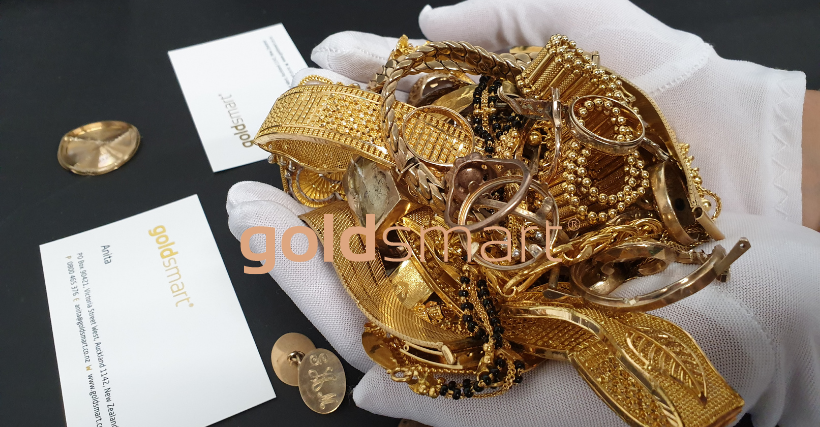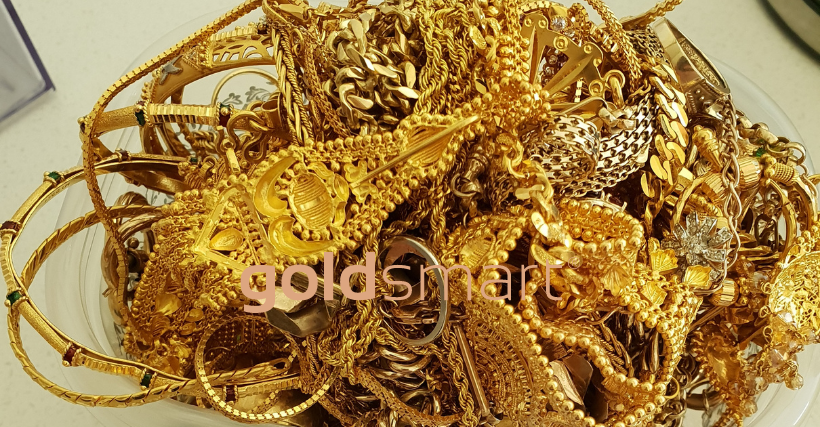Gold jewellery has always been valuable, but that doesn’t mean that it will automatically command prices higher than the gold-content value, or anything close to what you might pay buying gold jewellery retail. The fact is, gold jewellery is frequently marked up well above what the precious metal is actually worth at the time, and it would take a significant amount of appreciation to match or cover the retail premiums. Very old items of jewellery that are collectible or rare, may achieve values above gold spot prices, however value of gold jewellery typically is based on gold content alone when selling in the second-hand jewellery market.
Why Sell Gold Jewellery
Selling personal gold that is unwanted, second-hand, broken or just not fashionable anymore has always been a smart move. What good is that asset if it’s just sitting in the back of a cabinet drawer collecting dust? Not much. Instead, by liquidating it for the value of the precious metal involved, the cash obtained can be used for all sorts of needs and wants right now or for the future. That can include helping with a house down payment, school tuition or books, a car repair, a medical need, a new home entertainment system, a trip, a new hobby or similar. Selling old gold just makes a lot of sense, and you get to decide for how much, as well as how that payment will be used to make your own life better afterwards.
How to Sell Gold Jewellery
There are a few options to consider when selling gold jewellery, including ‘gold parties’, selling privately or to a professional business. Most people today think of a ‘pawn shop’ with garish advertisements or selling their jewellery online on auction sites like Trademe, but these are not the only avenues for selling gold. There are also private sales to other individuals, pawn shops, gold parties which provide a temporary but easy means to sell personal gold once in a while, and trade channels as well where gold is traded for some other property that is useful or needed. However, just because there are a lot of ways to sell personal and unwanted gold, that doesn’t mean they are the best avenue or will produce the best sale price for the personal seller. A lot of challenges and snafus can occur with many of these options, especially if one is not paying attention to their surroundings or whom they are dealing with.

3 Tips on Selling Gold Jewellery for a Good Price
Tip #1 – Watch the Market Before Selling
Understanding the value of gold on the spot market has a big impact on when to sell second-hand gold jewellery. The precious metal that makes up jewellery for sale goes up and down in value based on the spot market. The actual price a personal seller is offered will be a percentage of the market spot value depending on a number of factors including the quality/purity of the gold involved, the metal type, the total weight of the gold, business overheads, and associated refining costs.
However, even with all of these factors involved, when the gold market goes up, so does the value of all gold, whether new or second-hand. However, when gold drops in value, so does everything related to it. Ideally, a personal buyer wants to sell at a time when the market is rising or at a much higher price point than when the jewellery was bought originally.
For example, someone who bought gold jewellery in the 1970s or 1980s would be in a very good position right now in the 2020s to sell those items as gold has appreciated significantly since those decades. On the other hand, someone who just received a ring or necklace from a good sale a few years ago would probably take a loss if they had been the original buyer from a jewellery store as the very high mark-ups paid when buying gold jewellery retail.
Gold will always sell dictated by supply and demand. One has to pay attention to what is happening with the market (gold spot prices and currency exchange rates) and do some homework if planning to unload a sizable amount of gold jewellery for sale and expecting a notable return. While gold will likely always be considered a great asset in which to store value and wealth, that doesn’t mean buyers automatically have to pay out to personal sellers at top market prices. If there is too much gold floating around in the market, the prices become depressed, and personal sellers will find it very hard to come close to their expectations for sales.
Tip #2 – Don’t Take the First Price Offered
Personal sellers who have had some experience know the first price offered will be the lowest possible for second-hand jewellery. Folks should always hold out for a better price, even if it means having to shop around a bit. Remember, gold buyers have lots of folks coming to them on a regular basis selling gold, so one individual sale is not going to be the end of the world if it falls through. However, when gold is in high demand, buyers might offer a lower price at first, but if the sale represents a sizable holding, they can be quick to make a second offer when told politely, “no.” Personal sellers should always try to do a bit of professional haggling to get the best price possible for their gold jewellery.
Smart personal sellers will have done their homework and will have been given multiple offers for their gold. That might take a bit of footwork and multiple meetings, but the difference can be worth it when one buyer decides to beat out the others to have access to the gold available. In these situations, bigger lots with higher quality gold will tend to be more attractive than smaller amounts and lower quality, i.e. lower gold content.
Remember, gold jewellery with hallmarks and high carat value is worth a lot more than miscellaneous gold with no marketing whatsoever. Hallmark gold brings with it a known standard of gold quality and manufacturing as the hallmark represents a specific company and producer certified for their gold quality. Known and stamped carat value also makes it clear when gold is a higher purity than mixed gold versions that might be stronger but are cheaper in gold content. Don’t let your high quality gold with clear marking get lumped into the pricing of lower quality lots to sell jewellery successfully. That would be giving away a definitive sale price value for free.

Tip #3 – Not all Gold Jewellery is the Same
If you need to know where to sell gold jewellery that involves mixed items such as gold coins set in pendants or rings, you may want to take a look at those coins or sets first. Occasionally gold coins may be worth more as collectibles than the pure precious metal value for the second-hand gold in a sale. Collectibles, gold bullion coins, specific sets or pieces made by a particular crafter all trigger collectible value that sometimes can be worth a more through the right dealer and channel. Again, pay attention to what you have for sale and do homework on it before selling. You may be surprised that its value is worth more than just selling it for gold alone.
Gold Smart is Always Available for Safe Gold Selling
If wondering where can I sell my gold jewellery safely, Gold Smart has always been a secure and dependable gold-buying channel for second-hand and unwanted gold pieces. As long as the jewellery is made of gold and doesn’t have precious stones inlayed or mixed, the jewellery is very likely a good candidate for sale to Gold Smart’s buying teams. With a safe, private approach, Gold Smart provides the professionalism of a licensed business, a strong New Zealand reputation for customer service, and competitive pricing tied to current spot market valuations. Most customers who have experienced Gold Smart have been so pleased, they’ve become regular gold sellers again and again. Try the difference and avoid the games. Gold Smart is ready for you and your gold jewellery when you are.